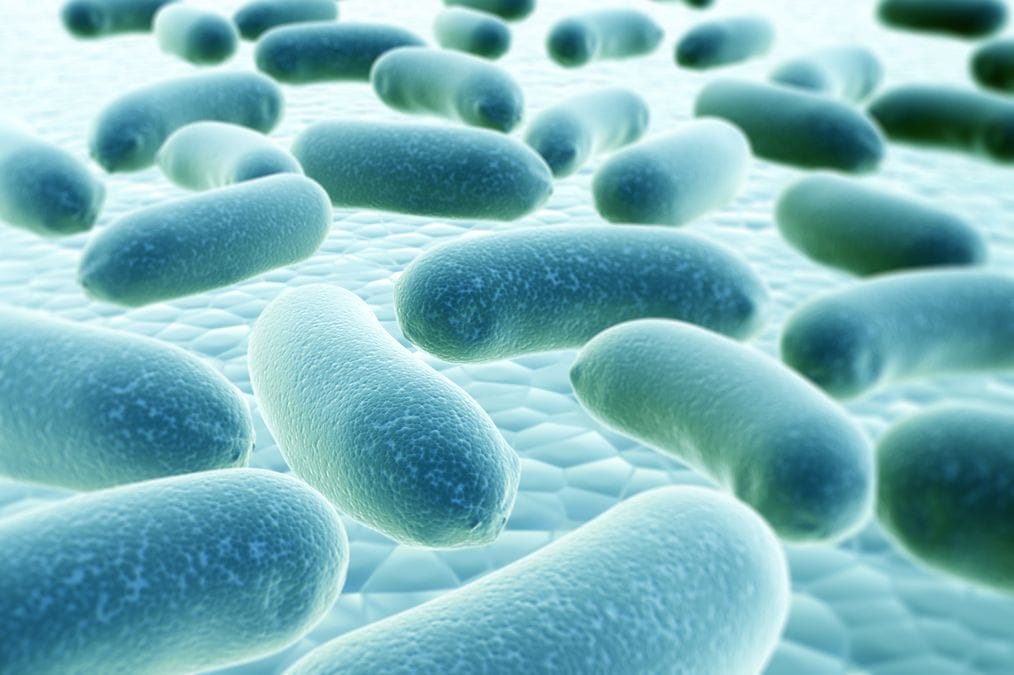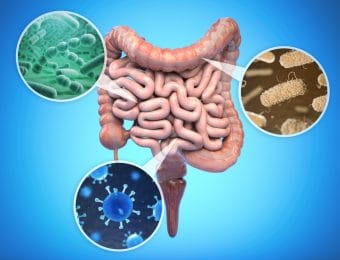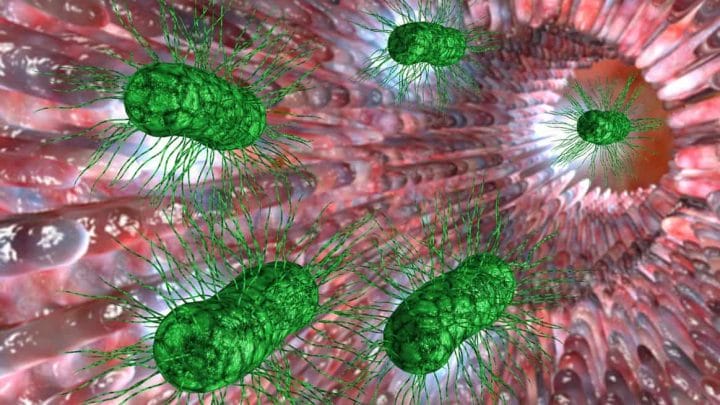
Microbiota – influence of gut bacteria on the body
The gastrointestinal microbiome of the human body consists of more than 1000 species of bacteria, and the intestinal microbiota is defined as all the bacteria residing in our large intestine, and their composition and abundance is associated with the state of health. The microbiome includes bacteria, but apart from them we can also find viruses and eukaryotic organisms. Scientific research has allowed us to determine the exact human microbiome, as well as its important role in our lives.
Contents
Characteristics of the intestinal microbiota

The intestinal microflora has a huge impact on the human body. Mainly, the microbiota consists of Bacteroidetes and Firmicutes type bacteria. Of course, it is variable and is directly influenced by a person’s race and health status. In addition, it changes throughout our lives. The intestinal microbiota increases all the time during childhood, while adulthood is crucial, because then it is unidimensional. Further changes occur in the period of aging, where it becomes poorer. Therefore, it is then worth taking care of the proper intake of probiotics. The selection of probiotics should take place on the basis of stool tests results in order to supplement the missing strains of bacteria. Of course, such tests should be performed at any time of life, because the intestines are our second brain, and they also strengthen the proper work of the immune system. Probiotics is also important when we take antibiotics, because then the depletion of intestinal microflora occurs. Research has also shown that some of the bacteria in our intestines are fixed, and some change. This is influenced by such factors as infections, improper diet, chronic stress, pharmacotherapy or lifestyle. However, many scientific studies show that it is the diet that has the greatest impact on the intestinal microbiota. It is worth remembering that the state of our health also has an impact on the quantity and quality of intestinal bacteria. People suffering from diabetes, celiac disease, obesity or inflammatory bowel disease, for example, are characterized by low diversity.
Impact on the body
The microbiome affects human physiology in many ways. Mainly, it involves the digestion of ingredients through the digestive tract that are not digested by the enzymes of the digestive system. However, if there is dysbiosis in the intestines, i.e. poor microflora, there may be difficulties with proper digestion in the digestive tract.
The gut-brain axis
The statement that the intestines are our second brain is most correct. It is of great importance because it involves bidirectional information between the microflora, the gut, and the brain. This all happens through neuronal pathways that involve the centers and the enteric nervous system, and the cardiovascular system is also important. The information that is relayed through the circulatory system takes place through immune system regulators, hormones, neurotransmittershormones, the axis connecting the hypothalamus to the pituitary and adrenal glands, and bacterial metabolites, namely short-chain fatty acids. Studies have also shown that the microbiota affects:
- reflexes that result from damaged tissue,
- our stress behavior,
- the neurochemistry of the brain,
- food intake,
- emotional and social behavior.
In studies that have been done on mice it has been proven that the influence of the microbiota is essential for the social development of mice, and its inadequate composition in the gastrointestinal tract affects neurocognitive disorders, even autism. Additionally, such individuals show an increased stress response and have heightened anxiety reactions, compared to mice that have a normal composition of gut bacteria. A test was also performed to see what would happen when the bacteria in the gut of the mice were replenished. This led to a reduction in corticosterone levels, which are secreted during stress and anxiety. Through this experiment, the importance between the microflora, the gut, and the brain and the proper development of an individual’s nervous system was proven.
Bacteria that live in our intestines are responsible for the production of short-chain fatty acids, which have a great importance in the connection between the blood-brain barrier. This happens by increasing the production of proteins that are key in tight junctions. This is mainly about the tight junction of the intestinal cells, which cuts off the space between the cells. This makes the cells very tightly connected to each other. They resemble a network that is arranged in strands and protects us from pathogens. On the other hand, if there are breaks in the tight connection, harmful substances are released from the intercellular fluidto the blood, and finally to the brain, which may have a negative impact on brain function, mood and cognitive functions.
The microbiome and the psyche
In recent years, researchers have shown repeatedly that the influence of the intestinal microbiota is of great importance in our reactions to stress and anxiety, depressive disorders, and cognitive processes. Many trials have documented that the use of probiotic therapy, used interchangeably with prebiotics, has a beneficial effect on the condition of people struggling with psychological problems, anxiety, and depressive states. A significant impact of intestinal microflora appears in people who consume alcohol. We can observe permeability of the large intestine and changes in the composition of intestinal microflora, which cause increased depressive states and increased alcohol cravings.
Influence on digestion
In healthy individuals, bacteria are responsible for the digestion of dietary fiber, some proteins, and sugars. This leads to the production of short-chain acids, which are a source of energy for the intestinal epithelium, protect our immune system, and eliminate pathogenic bacteria in the digestive tract. It is also of great importance in the prevention of colorectal cancer, because proper prevention minimizes the occurrence of cancer in the future. This happens through inflammation and damage to DNA by harmful products of metabolism, which are responsible for tumor growth. In studies with this type of person, intestinal dysbiosis and a low number of bacterial species have been repeatedly observed. It has also been proved that in this type of disease the diet is important. It should be rich in dietary fiber, polyunsaturated fatty acids, products with antioxidant properties and probiotics. We can also take care of the supplementation of B vitamins, vitamin K. The production of gastrointestinal vitamins from healthy foods is also important. You must know that inflammation in the intestines can also be caused by depleted intestinal microflora, which eventually leads to colon cancer.
The importance of commensal bacteria
Commensal bacteria and properly selected probiotics have an important function in undermining the intestinal barrier so that pathogenic bacteria and their metabolic products do not reach our circulatory system. Good bacteria take part in reducing the appearance of infections by strengthening the immune system as they struggle with bad bacteria fighting for nutrients and space on the surface of the mucosa. Commensal bacteria also lead to a lowering of the pH in the intestine due to the production of lactate and short-chain acids, which perfectly neutralize inflammatory pathogenic bacteria. Recently, more and more studies are emerging that the influence of the microbiome is very important in shaping acquired immunity against chronic inflammation. Therefore, stool testing, proper selection of probiotic therapy and a healthy diet are important.
Impact of the microbiota on health

On the other hand, low bacterial diversity in the gastrointestinal tract is very often diagnosed in people with inflammatory bowel disease. This also leads to loss of protective functions, i.e. inability to ferment fiber and lack of production of important short-chain fatty acids, as well as a worse course of the disease. Inflammation in the intestines is an ideal place for the production of pathogenic bacteria, which do not benefit health and cause viral infections.
In the case of the cardiovascular system, the influence of the microbiome is twofold. Its good influence lies in the regulation of lipidogram, which leads to an increase in good cholesterol HDL and a decrease in triglycerides. The Lactobacilli strain has been proven to help eliminate bad cholesterol from blood vessels. This can also work the other way, as excess bad bacteria leads to the production of atherosclerotic plaque, which can cause a heart attack or stroke in the future.
Metabolic disorders caused by a lack of good bacteria in the gut can lead to the development of type II diabetes. Scientific studies have proven that gut bacteria are involved in glucose metabolism. Moreover, it has been proven which strains are responsible for the development of the disease and which ones inhibit it. In terms of health, the gut microbiota is linked to type II diabetes due to glucose homeostasis and insulin resistance in organs such as liver, muscle, and fat. The microbiota and its products regulate gut hormones and enzymes that inhibit insulin resistance and improve sugar tolerance.
Good gut bacteria also have an impact on rheumatoid arthritis because they contain microorganisms that affect the immune system. An imbalance in the gut leads to the development of many diseases, even RA. In this condition, the oral cavity is also studied for its microflora and its role in the development of the disease. Dysbiosis has also been shown in studies to be of great importance here.
The last discussed case in which bacteria are of great importance is obesity and overweight, which are the scourge of the XXI century. Many people are characterized by dysbiosis, which is caused by poor nutrition and an inappropriate lifestyle. It also results in immune dysregulation, altered regulation of intestinal hormones, and pro-inflammatory mechanisms. It is worth in this case to take care of a higher energy expenditure and a diet low in bad fats has a positive effect on the treatment of obesity.
Bibliography:
- Binek M: The human microbiome – health and disease. Post Microbiol 2012; 51,
- Rakowska M., Lichosik M., Kacik J., Kalicki B., The influence of the microbiota on human health, Pediatr Med Rodz 2016, 12 (4),
- Nowak, Adriana, Katarzyna Slizewska, and Zdzisława Libudzisz. “Probiotics-history and mechanisms of action”. Food Science Technology Quality 17.4 (2010).



